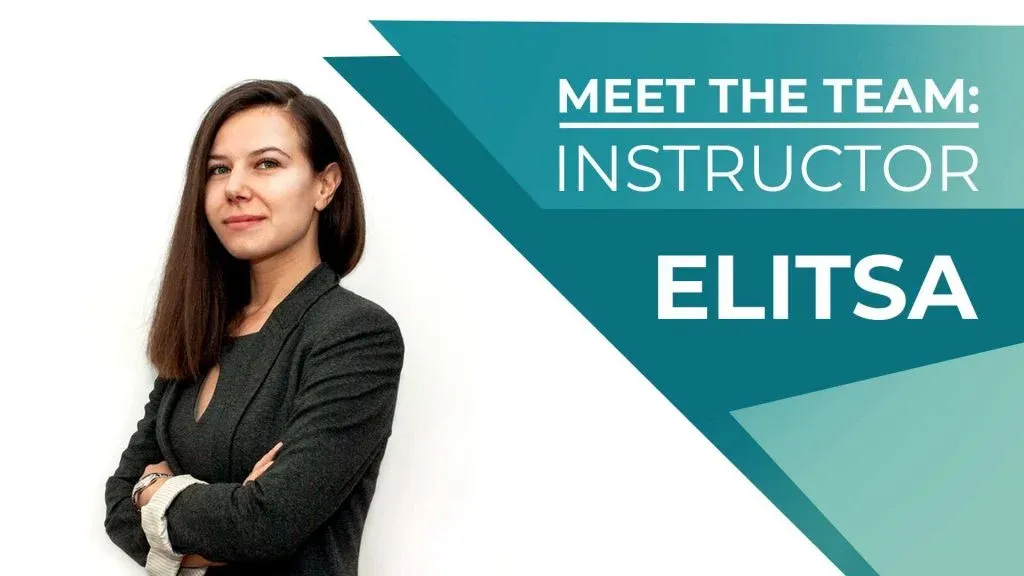Elitsa Kaloyanova, Instructor at 365 Data Science

Elitsa Kaloyanova is a Computational Biologist, with expertise in the fields of algorithms and data structures, phylogenetics, and population genetics. She has a solid academic background in Bioinformatics with publications on constructing Phylogenetic Networks and Trees. Elitsa is one of the authors of the courses Customer Analytics in Python and Data Visualization with Python, R, Tableau, and Excel.
Hi, Elitsa, could you briefly introduce yourself to our readers?
Hey, my name is Elitsa and I’m a computational biologist and recent data science convert.
That’s a really fresh way to put it! What do you do at the company and what’s the project you’re working on right now?
Well, I’m a part of the 365 Team and I’m a course creator. Right now, I’m working on an exciting new project, though I’m not sure I can share the details with you, it’s very hush-hush.
Alright, since we’re besties, I can tell you I am working on a Data Visualization course, which is something I’m very passionate about.
Great news! I’m happy we started the interview with this big reveal, Elitsa. Now, can you tell us a bit more about your academic background and experience?
I studied Bioinformatics in Germany. Bioinformatics, much like Data Science is a relatively new field. It combines mathematics and computer science to solve problems from the areas of life science: biology, medicine, physics, and chemistry. Areas like genetics, virology and health care are generating large amounts of data, which is why computer science needs to step in and find ways to analyze and efficiently store data. But another key aspect of the field is gaining insight from the data and understanding and developing new theories about what it tells us.
So, how do you apply your background skills to your position now?
I come from an analytics background, which is how I approach every new task or problem.
Nowadays, using a machine learning approach in Python only requires a few lines of code, so technically you don’t need to fully understand how a method works in order to use it.
But having a solid grasp on the mechanics of the approach is how you know which problems it can be applied to. And also what its strengths and weaknesses are. So, instead of just using methods as a black box and hoping one of them works, you understand far better which approach is appropriate for which problem.
But theory doesn’t give you everything and I am still learning a lot. For instance, working with real data is a big challenge! It is something you don’t really face in academia. Most of the time you work with clean and preprocessed data, so learning about data wrangling is something you first encounter when you start working or by devoting time to solve such problems on your own.
Sounds exciting! Elitsa, when did you decide that what you were doing was basically ‘data science’ in some places?
Well, this was more decided for me, I would say. Isn’t data science a relatively new term, anyways? I’m just basing that on the fact that most of my friends have no idea what that is. And they are constantly asking me what is it that I do exactly.
The terms I was more familiar with were machine learning and statistical learning. I think this is something that still confuses a lot of people, even if you’re not entirely new to the field.
Speaking of that, do you think data-science should be taught at schools as a compulsory subject?
That’s a really good question. I read an interview recently, with a biologist from Heidelberg University. He said that Data Science is going to be the new English, and I think there is truth to that.
Certainly, it is a field that is evolving and is becoming increasingly more important. Each year the sector grows and many people are entering it, often coming from different fields.
But I think the most important aspect of schools remains to give students a solid foundation, which they can later build on. Having an understanding of statistics, linear algebra and programming is key if you plan on pursuing a career in machine learning or computer science in general.
That’s a very on-point assessment of the current trends in data science. Now, a quick throwback question. Who inspired you to write your first line of code and when did that happen?
Hmm, it’s hard to remember actually. It must have been in school at some point. We had programming lessons pretty early on. But I certainly wasn’t inspired. That came much later, when I already had a solid understanding of programming and the thinking behind it. There was definitely a learning curve before I felt comfortable coding and inspiration knocked on the door.
We hear your family is very tech-savvy. How big an impact would you say this had on your educational and professional development?
Yes, that’s true. I come from a family of computer scientists, so I would begrudgingly have to say it had a big impact.
In all honesty, I can’t imagine how my life would’ve turned out under different circumstances.
But I feel really lucky, being set on this track. Certainly, when I started I had no idea that data science would become one of the most sought out career paths.
Elitsa, let’s go back to the future (pun intended). What area of data-science you’d like to explore in the future?
I am very passionate about neural networks. It’s an area that is still developing and seems to be entering just about every field of computer science, computer vision and NLP being just a few of them. But the boundaries of what we can achieve with neural nets are being pushed every day. So, it’s certainly an exciting topic.
And what area of data-science you would never explore?
I don’t think there is such an area. I think if you set boundaries by saying ‘I don’t find this area interesting’ or ‘This is area is too narrow to have enough impact’ you ultimately miss out on gaining new experiences and knowledge.
The first project I worked on in the company was focused on Customer Analytics: an area I had no prior experience in but found absolutely fascinating, and I learned a lot.
For instance, it turns out that people are more likely to buy a product which is on sale, even if it has the same price as a competitor product, which isn’t currently on sale.
Alright, some of you might have guessed that already, but seeing actual data that supports this idea and also thinking about who even came up with that idea, this I find to be very thrilling.
And it also changed the way I approach shopping as a consumer. I now think twice before buying an item, just because it has the sale sign on it.
That’s a good example to follow, Elitsa. Last question. Keeping the tradition alive, let’s finish with some nerdery. Is there a nerdy thing you’d like to share with the world?
Oh, I wouldn’t know anything about nerdy things and please disregard the Star Wars mug on my desk. I’m just borrowing that.
If I absolutely must come up with something, my love of British comedy is something I like sharing with other people. Actually, Vik and I often trade videos of our favourite (yes, this is the British spelling) sketches, which we most definitely do not watch during work hours.




